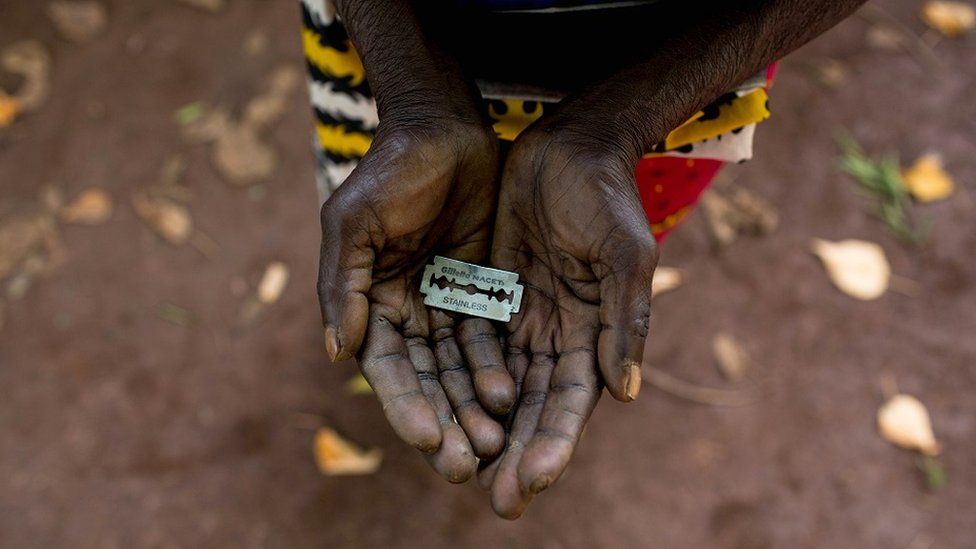Female genital mutilation or FGM, has been revealed as the leading cause of death among women and young girls in countries where it is practised, surpassing all other causes except Enteric Infections, Respiratory Infections, or Malaria, according to a new report.
Findings from researchers at Birmingham University indicate that an additional 44,000 women and young girls succumb to this practice annually in countries including Benin, Burkina Faso, Cameroon, Chad, Cote D’Ivoire, Egypt, Ethiopia, Guinea, Kenya, Mali, Niger, Nigeria, Senegal, Sierra Leone, and Tanzania.
In Nigeria, the data concerning FGM is disconcerting. The prevalence of FGM among women aged 15-49 stands at24.8%, and 82% of the women were cut before age five. An estimated 19.9 million women and girls in Nigeria have undergone FGM.
The regions in Nigeria with the highest prevalence ofFGM are the South East, where 32.0% of women aged 15–49 have undergone the practice, and the South West, with a prevalence rate of 30.0%. Imo State has the highest prevalence among states, at a staggering 61.7%.
When considering population numbers, the priority states shift from those with the highest percentages (Imo, Ekiti, Ebonyi, Kaduna, Kwara, and Osun) to those with the highest absolute numbers of affected girls and women, including Lagos, Kaduna, Imo, Kano, and Oyo.
Historically, FGM has been more prevalent in rural areas, but the landscape is evolving. In urban areas of Nigeria, 24.2% of women aged 15–49 have undergone FGM, compared to 15.6% in rural areas. Notably, recent years have witnessed a change in this trend, with 16.3% of daughters aged 0–14 in urban areas having experienced FGM, compared to 21.1% in rural areas.
What is FGM?
Female Genital Mutilation, also known as Female Genital Cutting or Female Circumcision, is a harmful cultural practice that involves the partial or complete removal of external female genitalia or other forms of injury to female genital organs, all performed for non-medical reasons.
Reasons for FGM:
While numerous organisations continue their efforts to eradicate the practice, some parents insist on FGM due to cultural beliefs. FGM is often regarded as a cultural tradition or rite of passage, believed to enhance a girl’s marriage prospects and ensure her purity.
In the Oronta community in Abia State, for example, the practice is encouraged and made mandatory for every girl child to be circumcised on the eighth day, often without proper knowledge.
Similarly, in the Amatolo community in Bayelsa State, FGM is performed to prevent the clitoris from touching a baby’s head, as it is believed that such contact could lead to the baby’s death.
Additionally, FGM is carried out in an attempt to curb promiscuity and preserve virginity. But this, as research has shown, is not the case.
Campaigners against the practice also contend that some women who perform FGM as a profession continue to propagate the practice to sustain their livelihood.
In some cases, FGM is performed due to the belief that it has health benefits, such as preventing urinary tract infections or making childbirth safer. However, medical evidence does not support these claims and widely discredits them.
One last push
Ending FGM, especially in Nigeria, will require a sensitivity to cultural contexts, community engagement, and strict implementation of the law.
For years, organisations working to end the practice have campaigned for a law that expressly bans the practice, and they got it in the Violence Against Persons Act, specifically section 6.
Section 6 of the VAPP Act stipulates a range of penalties for Female Genital Mutilation (FGM). These penalties encompass the following
1. Anyone who conducts or solicits another to perform FGM on any individual may be subject to imprisonment for a maximum period of 4 years, a fine not exceeding N200,000 or both.
2. Anyone who endeavours, assists, encourages, or provokes another to commit FGM could face imprisonment for a maximum duration of 2 years, a fine not exceeding N100,000 or both.
Also, at least 13 states across the country have promulgated their own laws to end the practice.
In addition, community engagement is vital. Encouraging community-led initiatives to abandon the practice can be highly effective. This includes working with local leaders and influencers to promote alternative rites of passage that do not involve FGM while respecting cultural traditions.
Engaging with youth and promoting gender equality are also important aspects of ending FGM, as they can help shift societal norms and beliefs over time. International cooperation, involving both neighbouring countries and global organisations, can further support efforts to eradicate FGM by sharing best practices, data, and resources in this critical fight to protect the rights and well-being of women and girls.
Female genital mutilation (FGM) is identified as a leading cause of death among women and young girls in certain countries, surpassing many other health threats. A report from Birmingham University reveals that 44,000 additional deaths occur annually due to FGM in countries such as Benin, Nigeria, and Egypt.
In Nigeria, 24.8% of women aged 15-49 have experienced FGM, with 82% undergoing the procedure before age five. The highest prevalence is found in the South East and South West regions, with Imo State particularly affected.
FGM, involving partial or total removal of female genitalia for non-medical reasons, persists due to cultural beliefs, traditions, and misconceptions about health benefits. Efforts to eradicate FGM in Nigeria include legal measures such as the Violence Against Persons Act, which imposes penalties for conducting or promoting FGM. Moreover, community engagement and education are essential to promote alternative rites of passage and shift societal norms.
International cooperation and local initiatives play crucial roles in combating FGM, aiming to secure the rights and well-being of women and girls.






